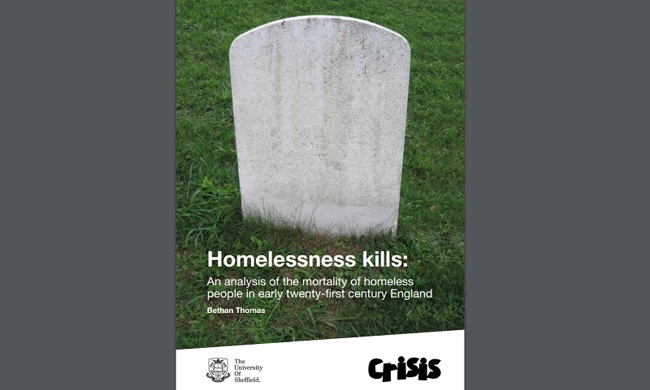Homelessness Kills (2012)
06.03.2012
This study investigates the mortality of homeless people in England for the period 2001-2009. It finds that homeless people are more likely to die young, with an average age of death of 47 years old, compared to 77 for the general population.
Main findings
- From the records of deaths in England between 2001-2009, 1,731 were identified as having been homeless people. Of these 90% were male and 10% female whereas the gender split of deaths of the adult general population is 48% male and 52% female.
- Nearly a third of the deaths of homeless people identified from the records were in the London region.
- Homeless people are more likely to die young, with an average age of death of 47 years old and even lower for homeless women at 43, compared to 77 for the general population, 74 for men and 80 for women. It is important to note that this is not life expectancy; it is the average age of death of those who die on the streets or while resident in homeless accommodation.
- At the ages of 16-24, homeless people are at least twice as likely to die as their housed contemporaries; for 25-34 year olds the ratio increases to four to five times, and at ages 35-44, to five to six times. Even though the ratio falls back
as the population reaches middle age, homeless 45-54 year olds are still three to four times more likely to die than the general population, and 55-64 year olds one and a half to nearly three times. - Drug and alcohol abuse are particularly common causes of death amongst the homeless population, accounting for just over a third of all deaths. Homeless people have seven to nine times the chance of dying from alcohol-related diseases and twenty times the chance of dying from drugs.
- Homeless men and women had similar mortality ratios for deaths due to alcohol, while for deaths due to drugs, men were seventeen times, and women thirteen times, more likely to die than the general population. Men were also more likely to die from cardiovascular problems than women.
As these findings clearly indicate, being homeless is incredibly difficult both physically and mentally and has significant impacts on people’s health and well being. Homelessness leads to very premature mortality and increased mortality rates. Ultimately, homelessness kills.
Reference
Thomas, B. (2012) Homelessness kills: An analysis of the mortality of homeless people in early twenty-first century England. London: Crisis.
Downloads

Homelessness Kills (PDF)
An analysis of the mortality of homeless people in early twenty-first century England

Homelessness Kills - Executive summary (PDF)
Executive summary of the full Homelessness Kills report.
